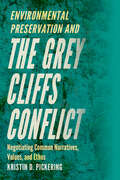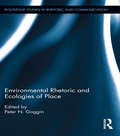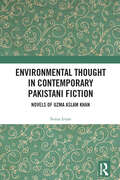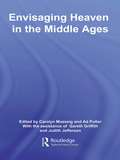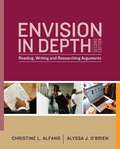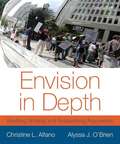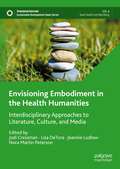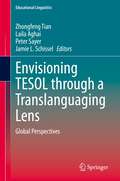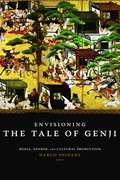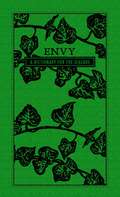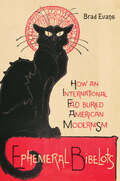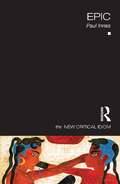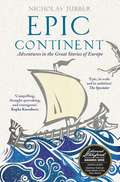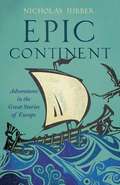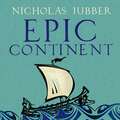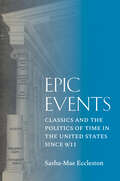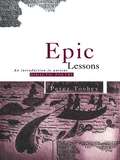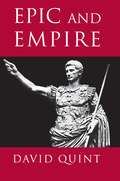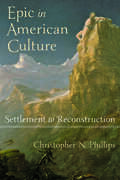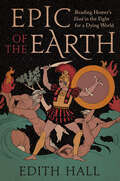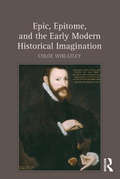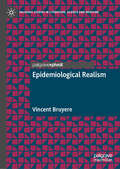- Table View
- List View
Environmental Preservation and the Grey Cliffs Conflict: Negotiating Common Narratives, Values, and Ethos
by Kristin D. PickeringBased on a qualitative, ethnographic, observational case study approach, Environmental Preservation and the Grey Cliffs Conflictpresents an analysis of the conflict negotiation between the U.S. Army Corps of Engineers and a local community that struggled to address a deteriorating Corps-managed recreational lake area in Tennessee known as “Grey Cliffs.” Viewing the dispute from the perspective of a new member of the community and a specialist in technical communication and professional writing, Kristin Pickering provides a unique perspective on this communication process. Though environmental degradation and unauthorized use threatened the Grey Cliffs recreational lake area to the point that the Corps considered closure, community members valued it highly and wanted to keep it open. The community near this damaged and crime-ridden area needed help rejuvenating its landscape and image, but the Corps and community were sharply divided on how to maintain this beloved geographic space because of the stakeholders’ different cultural backgrounds and values, as well as the narratives used to discuss them. By co-constructing and aligning narratives, values, and ethos over time—a difficult and lengthy process—the Corps and community succeeded, and Grey Cliffs remains open to all. Focusing on field notes, participant interviews, and analysis of various texts created throughout the conflict, Pickering applies rhetorical analysis and a grounded theory approach to regulation, identity, sustainability, and community values to analyze this communication process. Illustrating the positive change that can occur when governmental organizations and rural communities work together to construct shared values and engage in a rhetoric of relationship that preserves the environment, Environmental Preservation and the Grey Cliffs Conflict provides key recommendations for resolving environmental conflicts within local communities, especially for those working in technical and professional communication, organizational communication, environmental science, and public policy.
Environmental Rhetoric and Ecologies of Place (Routledge Studies in Rhetoric and Communication)
by Peter N. GogginUnderstanding how rhetoric, and environmental rhetoric in particular, informs and is informed by local and global ecologies contributes to our conversations about sustainability and resilience — the preservation and conservation of the earth and the future of human society. This book explores some of the complex relationships, collaborations, compromises, and contradictions between human endeavor and situated discourses, identities and landscapes, social justice and natural resources, movement and geographies, unpacking and grappling with the complexities of rhetoric of presence. Making a significant contribution to exploring the complex discursive constructions of environmental rhetorics and place-based rhetorics, this collection considers discourses, actions, and adaptations concerning environmental regulations and development, sustainability, exploitation, and conservation of energy resources. Essays visit arguments on cultural values, social justice, environmental advocacy, and identity as political constructions of rhetorical place and space. Rural and urban case studies contribute to discussions of the ethics and identities of environment, and the rhetorics of environmental cartography and glocalization. Contributors represent a range of specialization across a variety of scholarly research in such fields as communication studies, rhetorical theory, social/cultural geography, technical/professional communication, cartography, anthropology, linguistics, comparative literature/ecocriticism, literacy studies, digital rhetoric/media studies, and discourse analysis. Thus, this book goes beyond the assumption that rhetorics are situated, and challenges us to consider not only how and why they are situated, but what we mean when we theorize notions of situated, place-based rhetorics.
Environmental Thought in Contemporary Pakistani Fiction: Novels of Uzma Aslam Khan
by Sonia IrumThis book looks at Pakistani fiction from an environmental perspective, focusing on the novels of the internationally renowned author Uzma Aslam Khan. It explores the rich environmental landscapes of Khan’s works and their distinctive contribution to developing Pakistani ecocriticism.The book examines the discourse on the environment in contemporary Pakistani fiction in English and the contribution of Khan’s fiction, such as The Story of Noble Rot, Trespassing, Thinner than Skin, and others, towards developing ecological thinking in Pakistani literature and literary criticism. In her novels, Khan gives voice to the nonhuman or the ‘Other’, highlights the harmonious connections between humans and nature, and reflects on the far-reaching ecological, social, and health effects of climate change. The author showcases literary activism and analyses how the ‘state’ engages with the ecopolitical discourses in Pakistani society by studying the intersections of Western imperialism, militarism, state policies, capitalism, consumerism, and global climate change.The book will be of interest to students and researchers of English literature, environmental studies, ecocriticism, literary and critical studies, postcolonial studies, and indigenous studies.
Envisaging Heaven in the Middle Ages (Routledge Studies in Medieval Religion and Culture)
by Ad Putter Carolyn MuessigEnvisaging Heaven in the Middle Ages deals with medieval notions of heaven in theological and mystical writings, in visions of the Otherworld, and in medieval art, poetry and music. It considers the influence of such notions in the secular literature of some of the greatest writers of the period including Chrétien de Troyes and Chaucer. The coherence and beauty of these notions make heaven one of the most impressive medieval ‘cathedrals of the mind’. With contributions from experts such as A.C. Spearing, Peter Meredith, Peter Dronke and Robin Kirkpatrick, this collection is essential reading for all those interested in medieval religion and culture.
Envision In Depth: Reading, Writing, and Researching Arguments
by Christine Alfano Alyssa O'BrienEnvision in Depth: Reading, Writing, and Researching Arguments 2/e, is a combined rhetoric and reader intended for composition courses focusing on argumentation and research-based writing. Taking contemporary culture as its central theme and context, Envision in Depth is concerned with the fundamentals of analyzing and writing powerful, effective arguments. Students using Envision in Depth will learn how to analyze and compose arguments, design and conduct research projects, and produce persuasive visual and oral presentations in response to over 100 contemporary arguments in a wide range of verbal and visual genres.
Envision in Depth: Reading, Writing, and Researching Arguments (Third Edition)
by Christine L. Alfano Alyssa J. O'BrienThe book presents the fundamentals of analysing and writing powerful, effective arguments.
Envisioning Embodiment in the Health Humanities: Interdisciplinary Approaches to Literature, Culture, and Media (Sustainable Development Goals Series)
by Nora Martin Peterson Jodi Cressman Lisa DeTora Jeannie LudlowEnvisioning Embodiment in the Health Humanities: Literature, Culture, and Media examines discourses of embodiment across disability studies, gender studies, cultural studies, and visual studies to inform educational practice as well as cultural criticism related to the health and medical humanities. The book argues that imagery and other visual elements in literature, comics, lived experience and the arts demonstrate the hybridity of the embodied experience and identity and have something to offer to clinical practice. Connected to the UN Sustainable Development Goals 3 (Health), 4 (Gender equality), and 16 (Strong institutions), the topics addressed in the essays include mental health, grief, COVID-19, healthcare practices, cancer, and women’s health. The volume is designed to be accessible to advanced undergraduate students as well as graduate students and to be useful for medical practitioners and others who are interested in the health humanities, disability studies, gender studies, or cultural studies.
Envisioning TESOL through a Translanguaging Lens: Global Perspectives (Educational Linguistics #45)
by Peter Sayer Zhongfeng Tian Laila Aghai Jamie L. SchisselTo respond to the multilingual turn in language education, this volume constitutes a challenge to the traditional, monolingual, and native speakerism paradigm in the field of Teaching English to Speakers of Other Languages (TESOL) through a translanguaging lens. The chapters offer complex global perspectives – with contributions from five continents – to open critical conversations on how to conceptualize and implement translanguaging in teacher education and classrooms of various contexts. The researchers exhibit a shared commitment to transforming TESOL profession that values teachers’ and learners’ full linguistic repertoires. This volume should prove a valuable resource for students, teachers, and researchers interested in English teaching and learning, applied linguistics, second language acquisition, and social justice.
Envisioning The Tale of Genji: Media, Gender, and Cultural Production
by Ed. Shirane HaruoBringing together scholars from across the world, Haruo Shirane presents a fascinating portrait of The Tale of Genji's reception and reproduction over the past thousand years. The essays examine the canonization of the work from the late Heian through the medieval, Edo, Meiji, Taisho, Showa, and Heisei periods, revealing its profound influence on a variety of genres and fields, including modern nation building. They also consider parody, pastiche, and re-creation of the text in various popular and mass media. Since the Genji was written by a woman for female readers, contributors also take up the issue of gender and cultural authority, looking at the novel's function as a symbol of Heian court culture and as an important tool in women's education. Throughout the volume, scholars discuss achievements in visualization, from screen painting and woodblock prints to manga and anime. Taking up such recurrent themes as cultural nostalgia, eroticism, and gender, this book is the most comprehensive history of the reception of The Tale of Genji to date, both in the country of its origin and throughout the world.
Envisioning the Tale of Genji: Media, Gender, and Cultural Production
by Haruo ShiraneBringing together scholars from across the world, Haruo Shirane presents a fascinating portrait of The Tale of Genji's reception and reproduction over the past thousand years.
Envy: A Dictionary for the Jealous
by Media AdamsThe Seven Deadly Sins have sliced up the dictionary and taken what's theirs. No one vice is too greedy as each volume prides itself on having more than 500 entries. Word lovers will lust after these richly packaged volumes--and once you've collected all seven, you'll be the envy of all your friends.Envy: A Dictionary for the JealousEveryone else will be turning green when the Envious reveal their desirable new vocabularies. From A to Z, each entry feeds the monster and makes it want that much more.
Ephemeral Bibelots: How an International Fad Buried American Modernism (Hopkins Studies in Modernism)
by Brad EvansRestoring proto-modernist little magazines—known as ephemeral bibelots—to the scholarly canon.Emanating from the cabarets of modernist Paris, a short-lived vogue spread around the world for avant-garde journals known in English as "ephemeral bibelots." For a time, it seemed that all the young bohemians passing through Paris started their own bibelots modeled on Le Chat Noir, the esoteric magazine of the famed Montmartre cabaret. These journals were recognizable for their decadence, campy queerness, astounding art nouveau illustrations, fin-de-siècle color schemes, innovative typefaces, and practiced bohemianism. In Ephemeral Bibelots, Brad Evans relays the untold story of this late-nineteenth-century craze for bibelots, dusting off a trove of periodicals largely untouched by digitization. In excavating this forgotten archive, Evans calls into question the prehistory of modernist little magazines as well as the history of American art and literature at the turn of the twentieth century. Considering how artistic movements take shape, move, and disappear, the book is organized around three major themes—"vogue," "ephemera," and "obscurity"—with authors and artists to match. A full-color insert reveals a glorious array of bibelot covers.This revisionary history of print culture incorporates discussions of pragmatist philosophy and relational aesthetics; women writers like Juliet Wilbor Tompkins and Carolyn Wells; the graphic artists Will Bradley, Louis Rhead, and John Sloan; the dancer Loie Fuller; and twentieth-century figures like H. L. Mencken, Amy Lowell, and Anita Loos. Bringing nineteenth-century American literature and culture into conversation with modern art movements from around the world, Ephemeral Bibelots provides new ways of thinking about the centrality of various media cultures to the attribution of aesthetic innovation and its staying power.
Epic (The New Critical Idiom)
by Paul InnesThis student guidebook offers a clear introduction to an often complex and unwieldy area of literary studies. Tracing epic from its ancient and classical roots through postmodern and contemporary examples this volume discusses: a wide range of writers including Homer, Vergil, Ovid, Dante, Chaucer, Milton, Cervantes, Keats, Byron, Eliot, Walcott and Tolkien texts from poems, novels, children’s literature, tv, theatre and film themes and motifs such as romance, tragedy, religion, journeys and the supernatural. Offering new directions for the future and addressing the place of epic in both English-language texts and World Literature, this handy book takes you on a fascinating guided tour through the epic.
Epic Continent: Adventures in the Great Stories of Europe
by Nicholas JubberThese are the stories that made Europe.Journeying from Turkey to Iceland, award-winning travel writer Nicholas Jubber takes us on a fascinating adventure through our continent's most enduring epic poems to learn how they were shaped by their times, and how they have since shaped us. The great European epics were all inspired by moments of seismic change: The Odyssey tells of the aftermath of the Trojan War, the primal conflict from which much of European civilisation was spawned. The Song of the Nibelungen tracks the collapse of a Germanic kingdom on the edge of the Roman Empire. Both the French Song of Roland and the Serbian Kosovo Cycle emerged from devastating conflicts between Christian and Muslim powers. Beowulf, the only surviving Old English epic, and the great Icelandic Saga of Burnt Njal, respond to times of great religious struggle - the shift from paganism to Christianity. These stories have stirred passions ever since they were composed, motivating armies and revolutionaries, and they continue to do so today.Reaching back into the ancient and medieval eras in which these defining works were produced, and investigating their continuing influence today, Epic Continent explores how matters of honour, fundamentalism, fate, nationhood, sex, class and politics have preoccupied the people of Europe across the millennia. In these tales soaked in blood and fire, Nicholas Jubber discovers how the world of gods and emperors, dragons and water-maidens, knights and princesses made our own: their deep impact on European identity, and their resonance in our turbulent times.
Epic Continent: Adventures in the Great Stories of Europe
by Nicholas Jubber'The prose is colourful and vigorous ... Jubber's journeying has indeed been epic, in scale and in ambition. In this thoughtful travelogue he has woven together colourful ancient and modern threads into a European tapestry that combines the sombre and the sparkling' Spectator'A genuine epic' WanderlustAward-winning travel writer Nicholas Jubber journeys across Europe exploring Europe's epic poems, from the Odyssey to Beowulf, the Song of Roland to theNibelungenlied, and their impact on European identity in these turbulent times.These are the stories that made Europe.Journeying from Turkey to Iceland, award-winning travel writer Nicholas Jubber takes us on a fascinating adventure through our continent's most enduring epic poems to learn how they were shaped by their times, and how they have since shaped us.The great European epics were all inspired by moments of seismic change: The Odyssey tells of the aftermath of the Trojan War, the primal conflict from which much of European civilisation was spawned. The Song of the Nibelungen tracks the collapse of a Germanic kingdom on the edge of the Roman Empire. Both the French Song of Roland and the Serbian Kosovo Cycleemerged from devastating conflicts between Christian and Muslim powers. Beowulf, the only surviving Old English epic, and the great Icelandic Saga of Burnt Njal, respond to times of great religious struggle - the shift from paganism to Christianity. These stories have stirred passions ever since they were composed, motivating armies and revolutionaries, and they continue to do so today.Reaching back into the ancient and medieval eras in which these defining works were produced, and investigating their continuing influence today, Epic Continent explores how matters of honour, fundamentalism, fate, nationhood, sex, class and politics have preoccupied the people of Europe across the millennia. In these tales soaked in blood and fire, Nicholas Jubber discovers how the world of gods and emperors, dragons and water-maidens, knights and princesses made our own: their deep impact on European identity, and their resonance in our turbulent times.
Epic Continent: Adventures in the Great Stories of Europe
by Nicholas JubberShortlisted for the Stanford Dolman Travel Book of the Year 2020Award-winning travel writer Nicholas Jubber journeys across Europe exploring Europe's epic poems, from the Odyssey to Beowulf, the Song of Roland to the Nibelungenlied, and their impact on European identity in these turbulent times. These are the stories that made Europe.Journeying from Turkey to Iceland, award-winning travel writer Nicholas Jubber takes us on a fascinating adventure through our continent's most enduring epic poems to learn how they were shaped by their times, and how they have since shaped us. The great European epics were all inspired by moments of seismic change: The Odyssey tells of the aftermath of the Trojan War, the primal conflict from which much of European civilisation was spawned. The Song of the Nibelungen tracks the collapse of a Germanic kingdom on the edge of the Roman Empire. Both the French Song of Roland and the Serbian Kosovo Cycle emerged from devastating conflicts between Christian and Muslim powers. Beowulf, the only surviving Old English epic, and the great Icelandic Saga of Burnt Njal, respond to times of great religious struggle - the shift from paganism to Christianity. These stories have stirred passions ever since they were composed, motivating armies and revolutionaries, and they continue to do so today.Reaching back into the ancient and medieval eras in which these defining works were produced, and investigating their continuing influence today, Epic Continent explores how matters of honour, fundamentalism, fate, nationhood, sex, class and politics have preoccupied the people of Europe across the millennia. In these tales soaked in blood and fire, Nicholas Jubber discovers how the world of gods and emperors, dragons and water-maidens, knights and princesses made our own: their deep impact on European identity, and their resonance in our turbulent times.(P)2019 Hodder & Stoughton Limited
Epic Events: Classics and the Politics of Time in the United States since 9/11
by Sasha-Mae EcclestonAn analysis of ancient Greek and Roman works alongside contemporary literature, exploring how these classics shape our understanding of the politics of time in America Ancient Greek and Roman cultures have been privileged as authoritatively timeless throughout American history. American leaders capitalize on this privilege when, during periods of crisis, they allude to these cultures to offer relief, to reestablish trust in the status quo, and to promote national unity. Analyzing texts that also draw on ancient Greek and Roman material to respond to these crises, Sasha-Mae Eccleston explains how contemporary authors and artists have questioned calls for unity that homogenize disparate experiences and ignore systemic inequality. Their engagements with the temporalities of the ancient material reveal how time structures membership in the national community. Reading, for example, Seneca&’s drama Medea, Homer&’s epics, and the verses of Sappho alongside Jesmyn Ward&’s novel Salvage the Bones or the poetry of Ocean Vuong and Juliana Spahr, Eccleston examines the temporal politics of major events and everyday life in the United States. Epic Events shows how ancient works that seem to insulate audiences from disaster can actually alert them to the frightening hierarchization of American life. Eccleston skillfully weaves together analyses of ancient material and contemporary texts that range from memorials, visual art, and literature to speeches and public health declarations to bring questions of race, class, and gender into dialogue with time in thoughtful, nuanced, and original ways.
Epic Lessons: An Introduction to Ancient Didactic Poetry
by Peter TooheyDidactic Epic was enormously popular in the ancient world. It was used to teach Greeks and Romans technical and scientific subjects, but in verse. Epic Lessons shows how this scientific poetry was intended not just to instruct but also to entertain.Praise for its predecessor, Reading Epic'Toohey's erudition makes the complexities and the strangeness of these ancient poems appear as clear as daylight and his enthusiasm renders them as attractive as the latest blockbuster.' - JACT Review
Epic Lives and Monasticism in the Middle Ages, 800-1050
by Anna Lisa TaylorThis is the first book to focus on Latin epic verse saints' lives in their medieval historical contexts. Anna Taylor examines how these works promoted bonds of friendship and expressed rivalries among writers, monasteries, saints, earthly patrons, teachers and students in Western Europe in the central Middle Ages. Using philological, codicological and microhistorical approaches, Professor Taylor reveals new insights that will reshape our understanding of monasticism, patronage and education. These texts give historians an unprecedented glimpse inside the early medieval classroom, provide a nuanced view of the complicated synthesis of the Christian and Classical heritages, and show the cultural importance and varied functions of poetic composition in the ninth, tenth and eleventh centuries.
Epic Visions
by Caroline Vout Helen LovattThe epic genre has at its heart fascination and horror at viewing death. Epic heroes have active visual power, yet become objects, turned into monuments, watched by two main audiences: the gods above and the women on the sidelines. This stimulating and ambitious study investigates the theme of vision in Greek and Latin epic from Homer to Nonnus, bringing the edges of epic into dialogue with the most celebrated moments (the visual confrontation of Hector and Achilles, the failure of Turnus' gaze), revealing epic as both massive assertion of authority and fractured representation. It demonstrates the complexity of epic constructions of gender: from Apollonius' Medea toppling Talos with only her eyes to Parthenopaeus as object of desire. On display are the vertical gaze of the gods, mortal responses, prophets as penetrative viewers and rape victims, ecphrasis as objectification, women on the walls gazing sidelong, heroic bodies fragmented and fetishized.
Epic and Empire: Politics and Generic Form from Virgil to Milton (Literature in History #1)
by David QuintAlexander the Great, according to Plutarch, carried on his campaigns a copy of the Iliad, kept alongside a dagger; on a more pronounced ideological level, ancient Romans looked to the Aeneid as an argument for imperialism. In this major reinterpretation of epic poetry beginning with Virgil, David Quint explores the political context and meanings of key works in Western literature. He divides the history of the genre into two political traditions: the Virgilian epics of conquest and empire that take the victors' side (the Aeneid itself, Camoes's Lusíadas, Tasso's Gerusalemme liberata) and the countervailing epic of the defeated and of republican liberty (Lucan's Pharsalia, Ercilla's Araucana, and d'Aubigné's Les tragiques). These traditions produce opposing ideas of historical narrative: a linear, teleological narrative that belongs to the imperial conquerors, and an episodic and open-ended narrative identified with "romance," the story told of and by the defeated. Quint situates Paradise Lost and Paradise Regained within these rival traditions. He extends his political analysis to the scholarly revival of medieval epic in the late eighteenth and nineteenth centuries and to Sergei Eisenstein's epic film, Alexander Nevsky. Attending both to the topical contexts of individual poems and to the larger historical development of the epic genre, Epic and Empire provides new models for exploring the relationship between ideology and literary form.
Epic in American Culture: Settlement to Reconstruction
by Christopher N. PhillipsThe epic calls to mind the famous works of ancient poets such as Homer, Virgil, and Ovid. These long, narrative poems, defined by valiant characters and heroic deeds, celebrate events of great importance in ancient times. In this thought-provoking study, Christopher N. Phillips shows in often surprising ways how this exalted classical form proved as vital to American culture as it did to the great societies of the ancient world.Through close readings of James Fenimore Cooper, Lydia Sigourney, Henry Wadsworth Longfellow, and Herman Melville, as well as the transcendentalists, Phillips traces the rich history of epic in American literature and art from early colonial times to the late nineteenth century. Phillips shows that far from fading in the modern age, the epic form was continuously remade to frame a core element of American cultural expression. He finds the motive behind this sustained popularity in the historical interrelationship among the malleability of the epic form, the idea of a national culture, and the prestige of authorship—a powerful dynamic that extended well beyond the boundaries of literature.By locating the epic at the center of American literature and culture, Phillips’s imaginative study yields a number of important finds: the early national period was a time of radical experimentation with poetic form; the epic form was crucial to the development of constitutional law and the professionalization of visual arts; engagement with the epic synthesized a wide array of literary and artistic forms in efforts to launch the United States into the arena of world literature; and a number of writers shaped their careers around revising the epic form for their own purposes. Rigorous archival research, careful readings, and long chronologies of genre define this magisterial work, making it an invaluable resource for scholars of American studies, American poetry, and literary history.
Epic of the Earth: Reading Homer's "Iliad" in the Fight for a Dying World
by Edith HallAn urgent study of Homer&’s Iliad, exposing the beginnings of the ecological disaster we now face and facilitating our understanding of its history The roots of today&’s environmental catastrophe run deep into humanity&’s past. Through this unprecedented reading of Homer&’s Iliad, the award-winning classicist Edith Hall examines how this foundational text both documents the environmental practices of the ancient Greeks and betrays an awareness of the dangers posed by the destruction of the natural landscape. Underlying Homer&’s account of brutal military operations, alliances, and cataclysmic struggle is a palpable understanding that the direction in which humanity was headed could create a world that was uninhabitable. Hall provides unparalleled insight into the ancient origins of climate change and argues that the Iliad exposes the deepest contradictions behind the environmental problems we have created. Indeed, it is possible that some of the violence done to the environment throughout history has been authorized, if not exacerbated, by the celebration of the exploitation of nature in Homer&’s poem. Drawing compelling analogies to contemporary poetry, literature, and film, Hall demonstrates that the Iliad, as a priceless document of the mindset of early humans, can help us understand the long history of ecological degradation and inspire activism to rescue our planet from disaster.
Epic, Epitome, and the Early Modern Historical Imagination
by Chloe WheatleyIn early modern England, epitomes-texts promising to pare down, abridge, or sum up the essence of their authoritative sources-provided readers with key historical knowledge without the bulk, expense, or time commitment demanded by greater volumes. Epic poets in turn addressed the habits of reading and thinking that, for better and for worse, were popularized by the publication of predigested works. Analyzing popular texts such as chronicle summaries, abridgements of sacred epic, and abstracts of civil war debate, Chloe Wheatley charts the efflorescence of a lively early modern epitome culture, and demonstrates its impact upon Edmund Spenser's The Faerie Queene, Abraham Cowley's Davideis, and John Milton's Paradise Lost. Clearly and elegantly written, this new study presents fresh insight into how poets adapted an important epic convention-the representation of the hero's confrontation with summaries of past and future-to reflect contemporary trends in early modern history writing.
Epidemiological Realism (Palgrave Studies in Literature, Science and Medicine)
by Vincent BruyereThis book examines what it means to live in an epidemiological reality, exploring the worldbuilding properties of epidemiology through the lens of critical theory, literary analysis, and visual culture. Whether we want it or not, we live in a world made of statistical correlations, risk factors, and social determinants of health, animal reservoirs and spillovers, containment strategies and curves to be flattened, prophylactic measures, and syndromic surveillance systems detecting in real-time potential outbreaks. This book uses a series of vignettes to show that we have lived in a version of that reality for quite some time now, even before the formalization of epidemiological tools and concepts at the beginning of the twentieth century.
